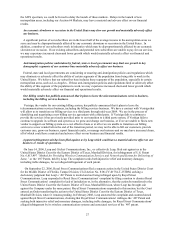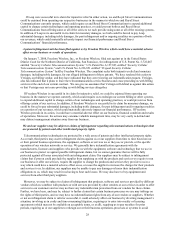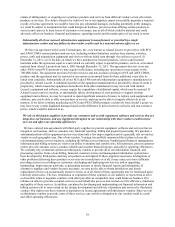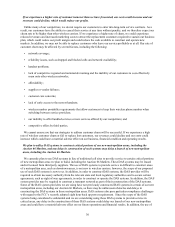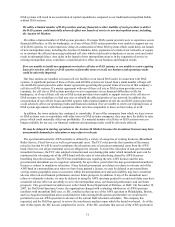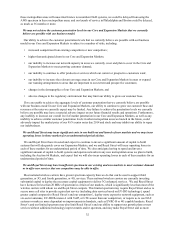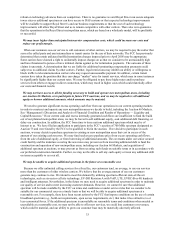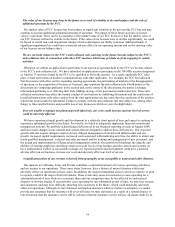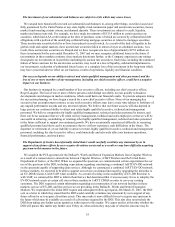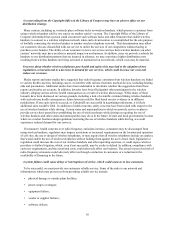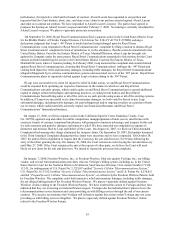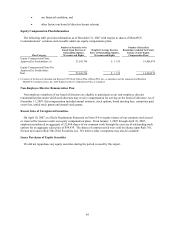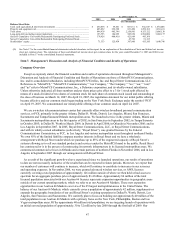Metro PCS 2007 Annual Report Download - page 48
Download and view the complete annual report
Please find page 48 of the 2007 Metro PCS annual report below. You can navigate through the pages in the report by either clicking on the pages listed below, or by using the keyword search tool below to find specific information within the annual report.
37
• human error;
• disruptions beyond our control, including disruptions caused by terrorist activities, theft, or natural
disasters; and
• failures in operational support systems.
Network disruptions may cause interruptions in service or reduced capacity for customers, either of which could
cause us to lose customers and incur expenses. Further, our costs to replace or repair the network may be substantial,
thus causing our costs to provide service to increase. We may also experience higher churn as our competitors
systems may not experience similar problems.
Unauthorized use of, or interference with, our network could disrupt service and increase our costs.
We may incur costs associated with the unauthorized use of our network including administrative and capital
costs associated with detecting, monitoring and reducing the incidence of fraud. Fraudulent use of our network may
impact interconnection and long distance costs, capacity costs, administrative costs, fraud prevention costs and
payments to other carriers for fraudulent roaming. Such increased costs could have a material adverse impact on our
financial results.
Security breaches related to our physical facilities, computer networks, and informational databases may cause
harm to our business and reputation and result in a loss of customers.
Our physical facilities and information systems may be vulnerable to physical break-ins, computer viruses, theft,
attacks by hackers, or similar disruptive problems. If hackers gain improper access to our databases, they may be
able to steal, publish, delete or modify confidential personal information concerning our subscribers. In addition,
misuse of our customer information could result in more substantial harm perpetrated by third-parties. This could
damage our business and reputation and result in a loss of customers.
Risks Related to Legal and Regulatory Matters
We are dependent on our FCC licenses, and our ability to provide service to our customers and generate
revenues could be harmed by adverse regulatory action or changes which may affect our licenses.
Some of our principal assets are our FCC licenses which we use to provide our services. Our FCC licenses are
subject to revocation if the FCC finds we are not in compliance with its rules or the Communications Act’ s
requirements. In addition, a failure to comply with these requirements or the FCC’ s construction requirements could
result in revocation or termination of our licenses or in the loss of rights to serve unbuilt areas. The loss or
impairment of any of these licenses and/or fines and forfeitures could have a material adverse effect on our business,
results of operations and financial condition.
We are subject to significant federal and state regulation, changes in which could have a material and adverse
effect on our business and financial results.
The FCC and state and local agencies regulate many aspects of our business. These regulatory agencies have and
may in the future adopt regulations or legal restrictions or take other actions that could adversely affect our business
by imposing new costs, requiring changes in our current or planned operations, slowing our growth, requiring us to
change the way we do business, or requiring us to make additional investments, all of which could materially and
adversely affect our business and financial results. In addition, a material failure to comply with FCC or statutory
requirements may limit our ability to draw certain amounts under our senior secured credit facility or could result in
a default under our credit facility.
The structure of the transaction with Royal Street creates risks because Royal Street may be required to pay back
credits received in the grant of its open licenses or forfeit closed licenses.
Royal Street acquired its PCS licenses as a very small business designated entity, or DE. As a result, Royal Street
received a bidding credit equal to approximately $94 million for its “open” PCS licenses and was granted certain
“closed” licenses in Florida in which DEs were the only qualified applicants. Certain recent regulatory
developments pertaining to the DE program indicate that the FCC plans to be proactive in assuring that DEs strictly


